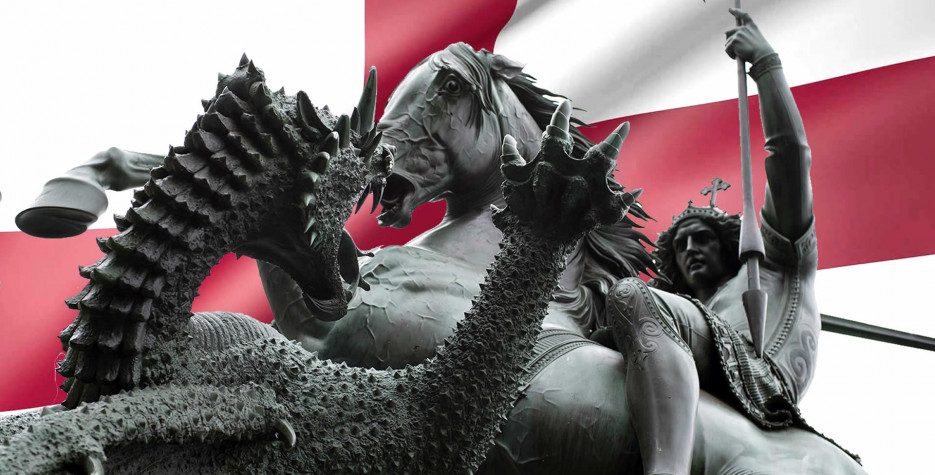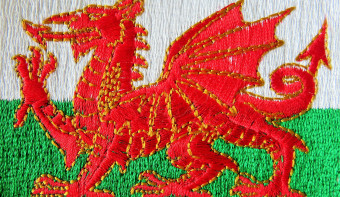About St. George's Day
When is St. George's Day?
St. George's Day is celebrated annually on April 23rd, as this is the generally accepted date of St. George's death.
St. George's Day is England's National Day, though it is not a national holiday afforded to the patron saints of other countries within the United Kingdom, like St. Andrew's Day in Scotland or St. Patrick's Day in Northern Ireland.
In addition to England, St George is the patron saint of Portugal, Georgia, Serbia, Bulgaria, Bosnia and Herzegovina, the Republic of Macedonia, and many cities across Europe. St. George's Day is also a regional holiday in the Aragon region of Spain and a provincial government holiday in Newfoundland, Canada. It is also a holiday for the government and schools in the state of Rio de Janeiro in Brazil.
St. George is the patron saint of many other organizations, including the Scout Movement, who have celebrated St. George's Day on April 23rd since its inception.
Who was St. George?
St. George was a cavalryman in the Roman army at Lydda, now in modern-day Israel. He was a Christian at a time when Rome was ruled by the emperor Diocletian, who was anti-Christian.
He refused to make sacrifices to the Roman gods. As a result, he was tortured over several years and eventually suffered a martyr's death, when he was beheaded in 303 AD.
He began to be venerated around the fifth century when a monastery was built and dedicated to him in Jerusalem.
The Dragon Slayer
Nowadays, it's not George's martyrdom that propelled him to popularity, but the tales of his heroism in slaying dragons and rescuing maidens. These stories started to appear sometime in the 11th Century and become famous across all of Europe and parts of Asia.
One version of the tale describes a dragon that would come from the sea to terrorise a nearby town. The locals offered animals each day to keep the monster from attacking further. When they ran out of animals, they became more desperate and started sacrificing humans. One day a princess was selected and about to be taken by the Dragon. Just as it was looking like the princesses fate was about to be sealed, St. George rode in on a white horse, and drove a lance down the throat of the beast.
St. George fighting the dragon from horseback is certainly the most enduring image from these stories. The dragon killer legends have been said to symbolize the victory of Christianity over paganism.
The Rise and Fall and Rise of St. George's Day in England
Compared to the other parts of the United Kingdom, St George seems to fare rather badly in terms of recognition of his national day. In England, it is barely acknowledged even though the national saint's days are holidays in Scotland and Northern Ireland. Most English people would struggle to recall even the date of St. George's Day
This wasn't always the case. His martyrdom was known in England from about 750AD. And in the 13th Century, his feast day was noted as a lesser holy day. His popularity increased with the Crusades as soldiers returned from the battlefront telling stories about St. George that they had heard while in the Middle East. It was King Edward III who introduced the battle cry "St. George for England" and later founded the Order of the Garter, with St. George as its patron.
St George's Day was once celebrated as widely as Christmas. But the celebrations had waned by the end of the 18th century after England had united with Scotland on May 1st 1707.
To mark the day, the Queen will announce new appointments to the Order of the Garter on St. George's Day.
After the battle of Agincourt, St. George's day was recognised as a major feast. However, its popularity had declined to its present-day levels by the start of the 19th century.
Quite how this Roman soldier became the patron saint of England is unclear. Maybe if George had closer ties to England, then celebrating his feast day would be more popular. There is certainly no indication that George was English and no evidence that he even ever visited England.
St. George seems to be enjoying a recent resurgence in popularity. Some politicians and media have been pushing to make his feast day the national holiday of England.
Organizations such as the Royal Society of Saint George and St George's Day Events are actively lobbying for more recognition of St. George's Day.
An interesting development is that some have proposed that St. George should be replaced by another Saint as the Patron Saint of England, given George's lack of connection with England. This is unlikely as St. Edmund, St. Cuthbert or St. Alban, who have all been touted as possible substitutes; do not carry any great degree of national awareness or affection.
A Day of Roses and Reading
Though St. George was an early Christian martyr, his fame seems inseparable from his supposed dragon-slayer skills. These legends began in the 11th century in modern-day Turkey and while the details differ in the many versions of the story, there always seems to be a Princess involved.
In Catalonia, the dragon-slaying takes place in Tarrangona where a ferocious dragon, capable of poisoning the air and killing with his breath, was terrorising the city. The inhabitants decided the only option was to keep the dragon happy by feeding him one person a day, chosen by a draw.
After several days, the princess was the unlucky one. When the princess left her home and headed towards the dragon, a knight named George, clad in shining armour and riding a white horse, suddenly appeared to rescue her. Saint George raised his sword and fatally stabbed the dragon - releasing the princess and the citizens from their torment.
From the dragon's blood, a rose bush grew with the reddest roses that had ever been seen. The gallant George picked one of the roses and offered it to the princess.
This grisly but ultimately romantic tale is why St. George's Day (Sant Jordi) is the Catalan equivalent of St. Valentine's Day and the most romantic day of the year.
Apart from Saint George, April 23rd is also the death anniversary of William Shakespeare and Cervantes (who both died on the same day), which is why it was declared World Book Day by UNESCO in 1995.
On this day, in addition to exchanging roses, it is a Catalan tradition to give a book as a present, leading to April 23rd, being known as the day of love and culture.
Find out moreSimilar Observances
Merchant Navy Day
Read More
St. Andrew's Day
Read More
Other Observances on April 23rd 2025
World Table Tennis Day 🏓
Read More












